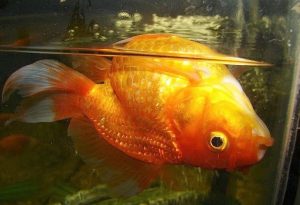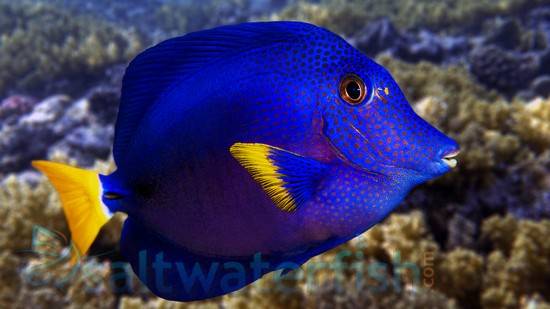Swim Bladder Disease, also called Floating Disorder, is a complication of the swim bladder that interrupts the fish from maintaining buoyancy.
Although it can affect any species of tropical fish that has a swim bladder, it is especially prevalent among Bettas and Goldfish.
PHYSICAL SYMPTOMS:
Fish suffering from swim bladder disease will have a distended belly which may eventually causes it to float upside down and appear dead.
Initially the affected fish will struggle to swim horizontally, have difficulty balancing and will float with its tail higher than its head until it can no longer hold it’s position. It will also have difficulty surfacing. These symptoms may occur after eating.
Many tropical fish keeping enthusiasts unaware of the condition assume that their fish has died when found floating upside down, but with proper care and an accurate diagnosis of the cause, Floating Disorder is treatable.
CAUSE:
Swim Bladder Disease is most commonly caused by compression of the fish’s organs which interferes with the proper functioning of the air bladder. Organ compression does not necessarily have to affect the bladder directly; but can affect the organs surrounding the bladder.
Swim Bladder Disease can also be caused by any of the following:
- An enlarged stomach caused by overfeeding
- An enlarged liver caused by fatty deposits in the body, usually from improper diet.
- Constipation, which compresses the intestines and exerts pressure on the bladder.
- An enlarged stomach caused by inhaling too much air from the surface (mainly in goldfish)
- Cysts that cause enlarged kidneys
- Physical injury from hard impacts. Mishandling, dropping, etc.
- Bacterial infections from improper maintenance
- Bacterial infections from parasite infestations
TREATMENT:
Treating Swim Bladder Disease obviously depends on the type of disorder and the underlying cause that created the problem.
If the fish suffered from a physical injury or had a birth defect, it is unlikely that the Floating Disorder can be successfully treated.
The first and foremost treatment is to water quality.
The water quality in the affected fish’s aquarium should be pristine. Making 20 to 30% partial water changes every two to three days virtually assures pristine water quality.
Aquarium salt should be added at a level of 2 tsp per gallon. Adding salt will maintain hydration and aid in electrolyte balance. Be careful that the species being treated is not sensitive to salt like most catfish, loaches, eels, etc.
Nutrition is one of the main culprits of Swim Bladder Disease.
Overfeeding can cause compression of the swim bladder. Treat this problem by not feeding the affected fish for three or four days. Withholding food for 3 or 4 days allows excessive gasses to be flushed from the fish’s system. Short term feeding of crushed peas also helps the removal of excess gasses from the fish’s gastrointestinal system.
After treatment, feed the affected fish very sparingly two or three times a day. If there is uneaten food in the tank after 5 minutes, you are overfeeding.
What you feed your fish can also cause Swim Bladder Disease.
Some fish species should not be fed high protein foods like live or frozen tubifex, bloodworms, beef hearts, etc. Discus for example are fine with this high protein diet, but many other species will suffer kidney damage which can lead to Floating Disorder. Many cichlid species require a herbivorous diet and when fed the wrong protein source could develop a gastrointestinal condition known as bloat. Feed your fish the balanced diet they require to treat Swim Bladder Disease.
Improper Water Temperature
Low water temperatures can cause indigestion in many tropical fish species. Indigestion or undigested food results in bloated bellies that causes buoyancy problems. When indigestion is suspected, increase the water temperature to 80 to 82 degrees F. and cut back on the amount of food for a few days. Adding a small amount of aquarium salt to the tank water also aids the process.
If symptoms persist, feed the affected fish a small amount of fresh spinach or a green pea without the skin as a laxative.
If you maintain pristine water conditions in your aquarium and the Nitrates, Nitrites, and Ammonia levels are correct, it is unlikely that Swim Bladder Disease is the result of environmental conditions.
Bacterial infections are normally the result of poor water quality due to over crowding, overfeeding, parasites, unclean conditions, etc.
When parasites are suspected as the cause and more than one fish is affected by Swim Bladder Disease, an antibiotic/anti parasitic treatment regimen may be necessary. Isolate the affected fish in a hospital tank, lower the tank water to about 4 inches, and carefully follow the instructions provided. Avoid using antibiotics whenever possible.
Generally, when more than one of your tropical fish suffers from Swim Bladder Disease on a regular basis, it is most likely that diet, overfeeding, or poor water quality is the culprit; all of which can be easily corrected.
If only one fish suffers from Swim Bladder Disease, and the above treatments do not reverse the problem, it may not be caused by environmental factors that are treatable and the fish may have to be euthanized.
PREVENTION:
Swim Bladder Disease is best prevented by providing your tropical fish with a pristine environment, the correct water temperature, and regular feedings of a varied, high quality diet.
Keeping the tank water immaculately clean and between 78 to 80 degrees F will eliminate most problems before they occur.
Adding a small amount of aquarium salt to the tank (depending on species) adds electrolytes and improves the well being of the fish.



